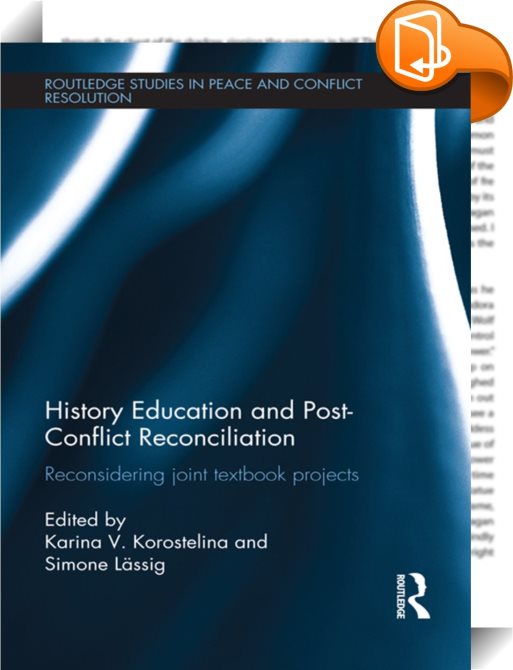History Education and Post-Conflict Reconciliation : Reconsidering Joint Textbook Projects
Free download. Book file PDF easily for everyone and every device. You can download and read online History Education and Post-Conflict Reconciliation : Reconsidering Joint Textbook Projects file PDF Book only if you are registered here. And also you can download or read online all Book PDF file that related with History Education and Post-Conflict Reconciliation : Reconsidering Joint Textbook Projects book. Happy reading History Education and Post-Conflict Reconciliation : Reconsidering Joint Textbook Projects Bookeveryone. Download file Free Book PDF History Education and Post-Conflict Reconciliation : Reconsidering Joint Textbook Projects at Complete PDF Library. This Book have some digital formats such us :paperbook, ebook, kindle, epub, fb2 and another formats. Here is The CompletePDF Book Library. It's free to register here to get Book file PDF History Education and Post-Conflict Reconciliation : Reconsidering Joint Textbook Projects Pocket Guide.
Contents:
It is crucial that history teaching transcend ethnocentric education in countries where nationalist rivalries are resurrected ad infinitum. Before attempting to respond to these challenges, let us define which region of Europe we are talking about and the conventions of historical education within it. This region, sometimes known by the neutral term southeast Europe, has a common past, stretching back centuries.
Its history includes cohabitation, in the context of the multi-ethnic Byzantine and Ottoman Empires, and conflict, be it the Balkan Wars of —13, the First and Second World Wars, or, more recently, the divisions of the Cold War.
Home Articles. Hoffmann, J. The knowledge they convey is relatively persistent and moreover highly selective: every textbook author must choose and omit, condense, structure, reduce, and generalize information. Furthermore, in many discussions a somewhat misplaced focus on stereotyping on the basis of ethnicity or religion can be observed. Boulder: Paradigm Publishers. The new curricula and textbooks are based on the concept of a Palestinian national history.
Particularly traumatic were the Yugoslav Wars of the s. The massive destruction of towns and monuments, hundreds of thousands of dead, ethnic cleansing, and displacement of millions—all reminded us that the repulsive face of war has reappeared many times in 20th-century Europe. For Balkan historians, alarm bells rang as soon as war enveloped the region.
Its aim was to record the state of affairs on the teaching of history across the Balkans, and then to propose changes in curricula through the publication of alternative educational materials for high school students. The CDRSEE was an NGO founded in in Greece by businessmen and diplomats of southeast European countries to promote reconciliation, democracy, and economic development in a region still ravaged by the war.
They made history education one of their top priorities and invited historians from the region to develop projects for revising textbooks and curricula. A group of more than 30 historians representing all the countries in the region, mainly academics who were experts in contemporary history and history education, responded to the challenge and formed the History Education Committee, which carried out the JHP.
Such initiatives were grounded in the certainty that continuing to teach the nationalistic history of the sort that dominated not only the classroom but the public sphere would undermine any prospect of peaceful coexistence and would do little to prevent the outbreak of new wars. Nationalistic histories, furthermore, propped up the widespread discourse of nationalism and populism, helping to enable the rise of far-right rhetoric and threatening the cohesion of all Balkan societies, within and without the former Yugoslavia.
In this region, the educational system operates under the rigid control of government agencies; textbooks are approved by departments of education on the basis of rigid curricular requirements, and teachers enjoy precious little autonomy. In Greece, for example, there is one textbook per subject and per class, approved and produced by the Ministry of Education and distributed free of charge to public schools, that dominates teaching.
Conspiracy theories were invented to account for what was castigated as an attempt to rewrite history, and contributors were targeted as instruments of unspecified global agencies. I coordinated the JHP from the very beginning.
Passar bra ihop
Skickas inom vardagar. Laddas ned direkt.

Skickas inom vardagar specialorder. This book analyses the role of history education in conflict and post-conflict societies, describing common history textbook projects in Europe, the Balkans, the Caucasus, the Far East and the Middle East. Ever since the emergence of the modern school system and the implementation of compulsory education, textbooks have been seen as privileged media.
Join Kobo & start eReading today
The knowledge they convey is relatively persistent and moreover highly selective: every textbook author must choose and omit, condense, structure, reduce, and generalize information. Within this context, history textbooks are often at the centre of interest. There are unquestionably significant differences regarding homogeneity or plurality of interpretations when concepts of history education are compared internationally.
There are unquestionably significant differences regarding homogeneity or plurality of interpretations when concepts of history education are compared internationally. This volume conducts a comparative analysis of common history projects in different countries and provides conceptual frameworks and methodological tools for enhancing the roles of these projects in the processes of conflict prevention and resolution.
This book is timely, as issues of history education in conflict and post-conflict societies are becoming more popular with the increased realisation that unresolved disagreements about historical narratives can, and often do, lead to renewed conflict or even violence.
- Repairing Structures Using Composite Wraps
- Promoting Emotional and Social Development in Schools: A Practical Guide
- Transactions of the Materials Research Society of Japan
- Death by Chocolate Cakes: An Astonishing Array of Chocolate Enchantments
- Quantum field theory and the Jones polynomial
- Children, Ethics, and Modern Medicine